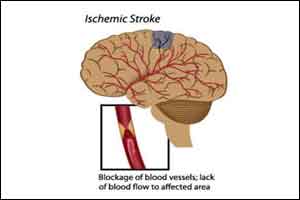- Home
- Editorial
- News
- Practice Guidelines
- Anesthesiology Guidelines
- Cancer Guidelines
- Cardiac Sciences Guidelines
- Critical Care Guidelines
- Dentistry Guidelines
- Dermatology Guidelines
- Diabetes and Endo Guidelines
- Diagnostics Guidelines
- ENT Guidelines
- Featured Practice Guidelines
- Gastroenterology Guidelines
- Geriatrics Guidelines
- Medicine Guidelines
- Nephrology Guidelines
- Neurosciences Guidelines
- Obs and Gynae Guidelines
- Ophthalmology Guidelines
- Orthopaedics Guidelines
- Paediatrics Guidelines
- Psychiatry Guidelines
- Pulmonology Guidelines
- Radiology Guidelines
- Surgery Guidelines
- Urology Guidelines
Dabigatran has lower risk of brain bleeds than warfarin in AF

A study of two medications that can reduce the risk of ischemic stroke in people with atrial fibrillation showed that outcomes in typical patients with atrial fibrillation align well with those seen in clinical trials. The findings were published on Nov. 14 in Annals of Internal Medicine.
This research, led by Alan Go, MD, director of the Comprehensive Clinical Research Unit within the Kaiser Permanente Division of Research, marks the first major study to examine outcomes of therapies for atrial fibrillation from the U.S. Food and Drug Administration Sentinel Initiative, a national multi-institution network to monitor the safety of new medical products after they reach the market.
Atrial fibrillation is an irregular heart rhythm that increases ischemic stroke risk. To reduce this risk, patients often receive treatment with the blood thinner warfarin, which has been in use since the 1950s, or a newer alternative such as dabigatran, approved by FDA in late 2010.
The analysis showed that both medications were associated with similar rates of ischemic stroke and overall bleeding. However, people taking dabigatran were less likely to experience bleeding in the brain, which can be dangerous or deadly. These findings were consistent with the results of prior clinical trials that compared the two drugs.
"Our study provides reassurance that stroke-related outcomes seen with dabigatran in selected trial participants translate into usual clinical care for patients with atrial fibrillation," Dr. Go said. "Importantly, while risks of ischemic stroke were similar for dabigatran and warfarin, dabigatran was safer from the standpoint of a lower risk of brain bleeds."
The study also addressed heart attack rates associated with each drug, but the results were inconclusive. Patients on dabigatran were more likely to experience a heart attack than patients on warfarin, but the statistical strength and consistency of this finding was unclear.
"The jury is still out," Dr. Go said. "We need more research to rule out the possibility that there might be a higher risk of heart attack with dabigatran in certain patients, such as those who are older and men."
National collaboration
The analysis incorporated data from 50,578 adults aged 21 and older with atrial fibrillation. The half started dabigatran and half started warfarin between November 2010 and May 2014. To ensure a fair comparison, patients taking dabigatran versus warfarin were statistically matched according to similar demographics, use of additional medications, and many other characteristics.
Patient data was contributed by eight Sentinel collaborators: Kaiser Permanente Northern California, Kaiser Permanente Washington, Aetna, Harvard Pilgrim Health Care Institute, HealthCore, Inc., HealthPartners Institute, Humana Comprehensive Health Insights, Inc., and Optum: Optum Epidemiology.
"The Sentinel program enabled us to look at adults of all ages -- not just older patients -- who received care across a variety of settings," said senior author Joshua Gagne, PharmD, ScD, of Harvard Medical School. "Ours isn't the first study to address this question outside of clinical trials, but it is the most wide-ranging and nationally representative."
Future research should examine which types of patients benefit most from which stroke-prevention strategies, Dr. Go said. Indeed, the new study mirrored prior clinical trial results showing higher rates of gastrointestinal bleeding with dabigatran in older patients and those with kidney disease, emphasizing that warfarin is likely still a better choice for some.
Dr. Go's research is now looking at how different patient characteristics might affect ideal treatment choice to optimize outcomes for atrial fibrillation.

Disclaimer: This site is primarily intended for healthcare professionals. Any content/information on this website does not replace the advice of medical and/or health professionals and should not be construed as medical/diagnostic advice/endorsement or prescription. Use of this site is subject to our terms of use, privacy policy, advertisement policy. © 2020 Minerva Medical Treatment Pvt Ltd